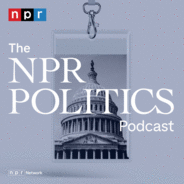The government announced the first ten drugs that are the subject of price negotiations between the U.S. government and private companies. For decades, the government has been prohibited from negotiating the price it pays through Medicare for medication — until the rule was relaxed under the Affordable Care Act.This episode: White House correspondent Tamara Keith, White House reporter Deepa Shivaram, and Pharmaceuticals correspondent Sydney Lupkin.The podcast is produced by Elena Moore and Casey Morell. Our editor is Eric McDaniel. Our executive producer is Muthoni Muturi. Unlock access to this and other bonus content by supporting The NPR Politics Podcast+. Sign up via Apple Podcasts or at plus.npr.org. Connect:Email the show at nprpolitics@npr.orgJoin the NPR Politics Podcast Facebook Group.Subscribe to the NPR Politics Newsletter.Learn more about sponsor message choices: podcastchoices.com/adchoicesNPR Privacy Policy

Politik
The NPR Politics Podcast Folgen
Every weekday, NPR's best political reporters are there to explain the big news coming out of Washington and the campaign trail. They don't just tell you what happened. They tell you why it matters. Every afternoon.Political wonks - get wonkier with The NPR Politics Podcast+. Your subscription supports the podcast and unlocks a sponsor-free feed. Learn more at plus.npr.org/politics
Folgen von The NPR Politics Podcast
1750 Folgen
-
Folge vom 30.08.2023After 30 Years, Here's Biden's Plan To Lower Drug Costs: Negotiate
-
Folge vom 29.08.2023The US Tried To Keep ICE Abuse Reports Secret. Here's What's InsideNPR obtained secret government inspection reports, which described "negligent," "barbaric" and "filthy" conditions inside Immigration and Customs Enforcement (ICE) detention facilities.For more than three years, under both the Trump and Biden administrations, the federal government fought NPR's efforts to obtain those records. That's despite a Biden campaign promise to "demand transparency in and independent oversight over ICE."This story contains graphic descriptions of mistreatment and death.This episode: White House correspondent Tamara Keith, political correspondent Kelsey Snell, and investigations correspondent Tom Dreisbach.The podcast is produced by Elena Moore and Casey Morell. Our editor is Eric McDaniel. Our executive producer is Muthoni Muturi. Unlock access to this and other bonus content by supporting The NPR Politics Podcast+. Sign up via Apple Podcasts or at plus.npr.org. Connect:Email the show at nprpolitics@npr.orgJoin the NPR Politics Podcast Facebook Group.Subscribe to the NPR Politics Newsletter.Learn more about sponsor message choices: podcastchoices.com/adchoicesNPR Privacy Policy
-
Folge vom 28.08.2023Biden Administration, NYC Spar Over Immigration PolicyIn New York City, more than 90,000 migrants or people seeking asylum have sought refuge since spring 2022. The city's Democratic mayor, Eric Adams, has asked for more federal assistance, and in the meantime, has cut back on services for those coming to his city. The Biden administration blames Congressional inaction.This podcast: White House correspondents Tamara Keith and Franco Ordoñez, and criminal justice correspondent Jasmine Garsd.The podcast is produced by Elena Moore and Casey Morell. Our editor is Eric McDaniel. Our executive producer is Muthoni Muturi. Unlock access to this and other bonus content by supporting The NPR Politics Podcast+. Sign up via Apple Podcasts or at plus.npr.org. Connect:Email the show at nprpolitics@npr.orgJoin the NPR Politics Podcast Facebook Group.Subscribe to the NPR Politics Newsletter.Learn more about sponsor message choices: podcastchoices.com/adchoicesNPR Privacy Policy
-
Folge vom 25.08.2023Get Ready To Be Badgered: Wisconsin Is A Presidential BattlegroundWisconsin's diverse geography and intense state politics have kept it a closely-fought presidential battleground for years — but abortion politics and the GOP's slipping grasp on the state's evolving suburbs might be changing things.And a family's journey to find care for their daughter — from Afghanistan to Mexico and then across the U.S. southern border — exposes the complicated state of affairs for Afghan immigrants and other migrants in the United States.This episode: White House reporter Deepa Shivaram, senior political editor and correspondent Ron Elving, WUWM reporter Maayan Silver, and Pentagon correspondent Tom Bowman.The podcast is produced by Elena Moore and Casey Morell. Our editor is Eric McDaniel. Our executive producer is Muthoni Muturi. Unlock access to this and other bonus content by supporting The NPR Politics Podcast+. Sign up via Apple Podcasts or at plus.npr.org. Connect:Email the show at nprpolitics@npr.orgJoin the NPR Politics Podcast Facebook Group.Subscribe to the NPR Politics Newsletter.Learn more about sponsor message choices: podcastchoices.com/adchoicesNPR Privacy Policy
